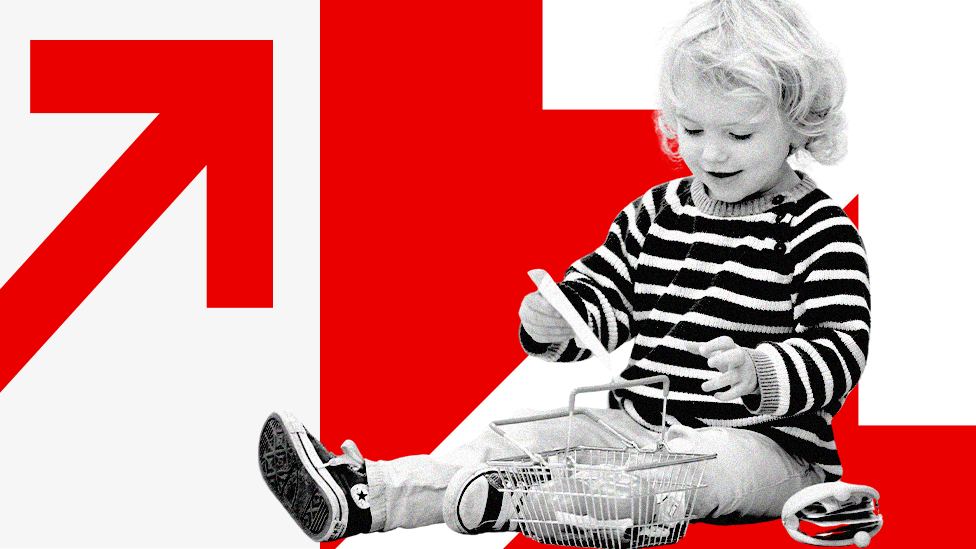Child benefit: What is it worth and who can claim it?

- Published
The government is targeting people who continue to claim child benefit after leaving the UK, in a move it hopes will save hundreds of millions of pounds.
More families have been able to claim the benefit after the limit on earnings was raised, and it is currently paid to 6.9 million households.
Who can get child benefit?
You can get child benefit if you are responsible for bringing up a child who is:
under 16
under 20 if in approved education or training (and you have notified HMRC), external
Only one person can claim child benefit for a child.
There is no limit to how many children you can claim for.
The money is usually paid into a bank account every four weeks. However, if you are a single parent or receive certain other benefits, such as universal credit, you can receive the money weekly.
The rules apply across the UK.
Claimants must tell HMRC if they go abroad for more than eight weeks, at which point they are no longer eligible for the benefit, unless there are exceptional circumstances, external.
The time limit for going abroad for medical treatment or due to the death of a family member is 12 weeks
The government is expanding a pilot project which stopped child benefit being incorrectly paid to 2,600 people who had left the UK, saving £17m.
A new specialist team will use international travel data to check whether claimants are still entitled to payments, in a move ministers hope will save £350m over five years.
How much is child benefit worth?
Since 7 April 2025, child benefit is worth:
£26.05 a week for the eldest or only child (up from £25.60)
£17.25 a week for younger children (up from £16.95)
You can find out how much child benefit you may be entitled to by using the government's child benefit calculator, external.
How much can I earn before I lose child benefit?
There is a limit to the amount you or your partner can earn before you start to lose child benefit.
Under the High Income Child Benefit Charge, external, payments start to reduce if one of you earns £60,000. They stop entirely when one of you earns £80,000.
The thresholds were increased from £50,000 and £60,000 in the 2024 Spring Budget, by the then-Conservative government.
However, the charge has been criticised for unfairly penalising single parents and families with one high earner.
A household where two parents earn £60,000 - with a total household income of £120,000 - can get the full amount.
But in a single income household the benefit is reduced once the parent earns more than £60,000 and cut altogether once they earn above £80,000.
Households which are affected by the high income charge can choose to get child benefit and pay the tax due every year, or can opt out of getting payments entirely.
How do you apply for child benefit?
You can claim child benefit 48 hours after you have registered a birth, or as soon as a child comes to live with you.
If you claim at a later point, payments can be backdated for up to three months.
You can claim online, external, by post, external or by phone, external.
You need the following documents:
your child's birth or adoption certificate
your bank or building society details
your National Insurance (NI) number
if you have a partner, their NI number

Only one parent can claim child benefit
How does child benefit affect National Insurance credits?
Claiming child benefit for a child under the age of 12 means you automatically get National Insurance (NI) credits, which count towards your state pension.
These credits can help fill gaps in your NI record if you are not working or if you don't earn enough to pay NI contributions.
The government recommends that you should still fill in the child benefit claim form even if the higher income charge means you do not get payments, so that you can get NI credits.
Doing so also means your child will automatically get an NI number when they turn 16.
What happens if your family circumstances change?
If a family splits up, the amount of child benefit paid depends on how many children there are, and where they live.
If you have two children and one stays with each parent, you would both get the higher amount for each child.
If you share custody of one or more children, only one of you can claim child benefit on their behalf.
The eldest will still be entitled to the higher amount, and any younger children will get the lower payment.
If two families join together, the eldest child in the new family qualifies for the higher rate, and any other eligible children get the smaller amount.
If a child dies, child benefit will usually be paid for another eight weeks, unless they would have turned 20 during the period, in which case payments stop the following Monday.